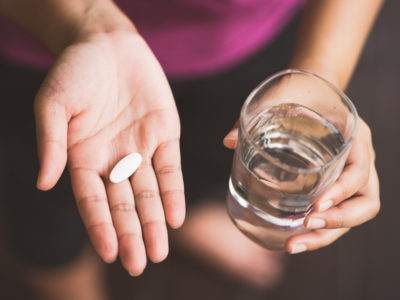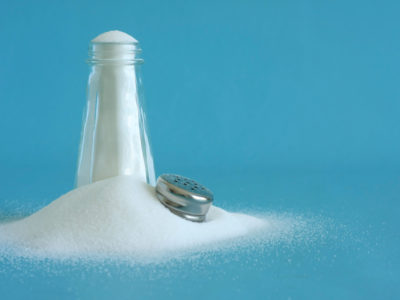Table of Contents[Hide][Show]
Whether it’s guzzling after a workout or small sips throughout the day, we all know one thing.
Water is essential to life.
But will any water do? Or are some types of water better than others?
Of the many choices out there, one stands out for health purposes: mineral water. It’s refreshing, hydrating, and filled with straight-from-the-earth minerals.
But exactly which minerals are in mineral water? And can drinking mineral water really have a positive impact on your health? Let’s “dive in” to the water world and find out.
Different Types of Water
Before we explore the possible benefits of mineral water, let’s look at the most common types of water: tap water, spring water, and mineral water.
Municipal Water
Municipal water, also known as tap water or public water, is the most accessible water for many people.
The municipal water in most areas usually comes from nearby lakes, rivers, wells, or reservoirs.
It’s processed at a special treatment plant to meet drinking water standards and then transported to your home through underground pipes.
Because municipal water is exposed to external conditions and atmospheric contaminants, the quality can vary greatly from one place to another. Some groundwater systems need very little treatment to meet federal requirements, while others need to be treated with chlorine or other chemicals.
These are some of the most common contaminants in tap water.
- Toxic metals, such as lead and arsenic (often from pipes)
- Toxic chemicals
- Pharmaceutical contaminants (i.e. from people improperly disposing of expired medicine)
- Chemicals used to sanitize water, such as chlorine, aluminum, copper, and fluoride
- Bromine, which occurs naturally in surface water
Although it’s regulated by the Environmental Protection Agency (EPA), municipal water isn’t subject to the same regulations as bottled water, which is closely monitored by the Food and Drug Administration (FDA).
While tap water is generally regarded as safe to drink, you may notice an odd taste or odor.
Related
11 Common Toxins That Harm Your Gut Health
Discover the toxins that harm gut health the most (some of which may surprise you) and how you can take steps today to cut them out.
Spring Water
Spring water is collected from an underground formation that allows water to flow naturally to the earth’s surface.
It’s collected at the spring itself or through boreholes that tap into its source.
Mineral Water
Like spring water, mineral water comes from underground sources. But it’s not limited to springs; mineral water can come from reservoirs, too.
The FDA has several regulations regarding mineral water.
- It must contain no less than 250 ppm (parts per million) of total dissolved solids. These solids are typically minerals and trace elements.
- It must come from boreholes or springs.
- It must originate from an underground water source that is geologically and physically protected.
Unlike spring water, federal regulations also require that mineral water be collected at its source.
Like municipal water, mineral water may be treated to eliminate potential contaminants or toxic substances.
Mineral water can also be found in a “sparkling” form, with natural or added carbon dioxide. This doesn’t affect the taste of the water, but if you prefer bubbly water, it might encourage you to drink more water, leading to better hydration.
What Minerals Are In Mineral Water?
As we mentioned earlier, the FDA requires a minimum quantity of dissolved solids, including minerals and elements, to be present in mineral water.
And in accordance with FDA regulations, the minerals and trace elements found in mineral water must occur naturally, meaning they can’t be added post-collection.
Which minerals and elements are included?
Research shows that the most common substances found in mineral water (and how they benefit the body) are:
- Bicarbonate: better digestion
- Calcium: strong bones, blood clotting, and muscle function
- Chlorine: digestive juice production
- Fluoride: preventing tooth decay and protecting bone health
- Iron: blood and muscle health
- Magnesium: strong bones, healthy heart, nervous and muscular function, and protein synthesis
- Phosphorus: protein synthesis and energy transport
- Potassium: muscular and myocardial function
- Sodium: cell permeability and fluid regulation
The kinds of minerals and exact amounts can vary vastly, depending on the water source. This can affect its taste and even odor.
For example, mineral water high in sodium might taste salty, while mineral waters with higher amounts of calcium or magnesium might taste slightly sweeter.
But are minerals in water good for you? Or are they harmful? Let’s find out.
The Benefits of Mineral Water
Now that you know the main minerals and elements in mineral water, let’s see how they affect your health.
Supports Healthy Bones
Depending on the mineral water you drink, it may contain calcium, which is well-established as being essential for the development and maintenance of strong, healthy bones and teeth.
Mineral water is a surprisingly good source of bioavailable calcium.
Some studies show that it’s just as, or even more effective than dairy products when it comes to providing calcium.
And another recent study shows that women who drank calcium-rich mineral water had a significantly higher bone density than those who drank mineral water with lower calcium levels.
In addition to calcium, the bicarbonate and magnesium in mineral water also play a strong role in supporting bone health.
Related
Your Complete Guide to Vitamin K2 (MK-7)
Learn how vitamin K2 MK7 differs from vitamin K1 and discover its functions and benefits, signs of deficiency, and how you can incorporate it into your daily diet.
Promotes Heart Health
Along with supporting your bone health, the magnesium in mineral water can also support your heart health.
At least one study shows that drinking mineral water with a higher magnesium content can lower the risk of fatal heart disease.
Mineral water can also reduce your risk of a heart attack or stroke by lowering your level of LDL (bad) cholesterol while raising your level of HDL (good) cholesterol.
And finally, high blood pressure—often a precursor to more severe heart issues—have been linked to lower levels of calcium and magnesium. Studies show that drinking mineral water containing these minerals can help regulate your blood pressure and improve your heart health.
Provides Extra Hydration
Mineral water is a great hydrator, thanks to its high electrolyte content.
Electrolytes are chemicals that help hydrate your body, rebuild damaged tissues, provide energy, and prevent cramps.
You lose electrolytes when you sweat excessively or lose body fluids due to illnesses such as a stomach virus, leaving you at risk of dehydration and other health issues.
There are electrolyte-rich hydration drinks and powders on the market, but these often have unwanted substances, too—sugar, artificial colors, artificial flavors, and more.
Mineral water is a healthier alternative, containing important electrolytes such as sodium, potassium, chloride, magnesium, calcium, phosphate, and bicarbonate.
The Possible Side Effects of Mineral Water
Although there are definite health advantages with mineral water, there are some drawbacks, too.
Here are some things you may want to keep in mind if you’re drinking mineral water.
May Contain Plastics
Mineral water, like other bottled water, can contain a dangerously high level of plastics.
Recent studies show that 1 liter of bottled water contains an average of 240,000 pieces of plastic.
Even worse, about 90% of these are nanoplastics, which are smaller and potentially more dangerous than microplastics.
Some of these originate in the filtering or purification process, while others come from the bottling method.
It’s also worth noting that if you are concerned about the environment and your plastic consumption (really we all should be), look for brands that use other materials for their bottling such as glass, aluminum, or boxes and utilize sustainable practices.
Can Be Too High In Sodium
It’s all about balance.
The same sodium that can be a benefit—due to electrolytes and added hydration—can also be a drawback.
Drinking mineral water high in sodium, especially if you’re already eating a diet high in salt or sodium, can lead to severe health issues.
- High blood pressure
- Higher risk of heart disease
- Higher stroke risk
If you’ve been advised to adopt a low-sodium diet or have health issues that require you to limit your sodium intake, look for mineral water with a lower sodium content.
Related
Sodium Solutions For Your Salt Cravings [INFOGRAPHIC]
Do you have salt cravings? Too much sodium can be unhealthy. Understand the causes of salt cravings and the steps you can take to curb them with these 7 sodium solutions.
Not a Strong Source of Minerals
Don’t let the label lull you into complacency.
Despite the minerals listed on the label, mineral water isn’t a strong enough source of minerals on its own.
Even if you drink plenty of mineral water throughout the day, you’ll still need to supplement it through a healthy, nutrient-rich diet.
And here’s something even more important to keep in mind:
It’s not just about how many minerals you’re taking in, it’s about how many minerals your body is absorbing.
Digestive disorders such as an unbalanced microbiome (or dysbiosis), leaky gut, and certain bowel diseases, can lead to malabsorption. This condition interferes with your body’s ability to absorb nutrients, eliminating them as a waste product instead.
A high-quality spore probiotic supplement can help keep your gut in balance and help your body make the most of the beneficial minerals and elements in your water.
Our favorite is Just Thrive Probiotic. This clinically-proven spore probiotic contains probiotic strains that are naturally equipped with a protective endospore shell, keeping them safe as they travel through your digestive system, allowing them to “arrive alive” 100% of the time.
Once they reach your gut microbiome, they get straight to work strengthening the colonies of beneficial bacteria already present in your gut and “crowding out” pathogenic bacteria, for a balanced and healthy microbiome.
And, it’s clinically-proven to address leaky gut in just 30 days. That means better nutrient absorption and a positive impact on your digestive and overall health.
Final Thoughts
Drink up!
Mineral water, with its important nutrients, can help improve your health while keeping you happily hydrated.
But on its own, it’s not quite enough. For optimal health, make sure you also take a quality spore probiotic and eat healthy, nutrient-rich meals—with a side of mineral water, of course!
You May Also Like…






